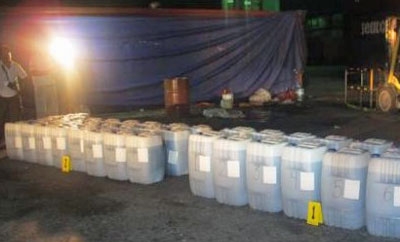Authorities in Mexico have confirmed the Sinaloa Cartel orchestrated a recently busted operation that exported liquid cocaine from Argentina, in a mark of both the group’s international growth and the threat posed to the South American nation by foreign organized crime.
The revelations follow the seizure of more than 2,000 kilos of liquid cocaine shipped from Argentina to Mexico’s Caribbean port of Progreso, and the subsequent capture of nine people in Argentina, including a Mexican engineer.
This ring was taken down as part of an ongoing joint investigation by Argentine and Mexican law enforcement. Mexican federal authorities believe the ring had been active for at least two years, reported 24 Horas.
SEE ALSO: Coverage of Argentina
According to 24 Horas, Mexican authorities have confirmed the Sinaloa Cartel financed and oversaw the operation, providing the technical expertise to dissolve the cocaine, which was then hidden in shipping containers and sent north to Mexico.
Authorities also suggested the group had sent a significant, but unknown, number of technical experts to Venezuela and Ecuador, in addition to Argentina, to take on similar roles.
InSight Crime Analysis
The information provided to 24 Horas confirms what InSight Crime speculated after initial reports of the drug ring’s links to the Sinaloa Cartel: that the Mexican criminal group has provided the scientific expertise to allow massive drug hauls to go undetected.
Less than three weeks after the Progreso haul, Argentine authorities seized a further 1,200 kilos of liquid cocaine, which was also subsequently linked to the same group.
The fact the Sinaloa Cartel apparently financed the entire operation is of note, as it provides yet another indication of the group’s growing interest in Argentina. While the group was thought to have initially moved into the country in pursuit of precursor chemicals for methamphetamine production, it is now clear its interests have expanded.
Argentina has long been a hub for foreign criminals, though where it was once more of a hideout and base of operations for fugitive Colombian criminals, it now appears to be the target of major criminal organizations seeking to take control of the country’s growing drug trade.
While Argentine officials have previously denied the large-scale presence of foreign cartels, the fact this operation had apparently been functioning for at least two years with technical assistance and financing from Mexico suggests the cartel presence could be much more deeply embedded than the government would like to admit.

